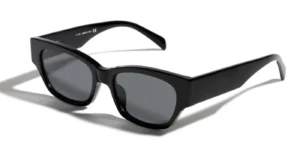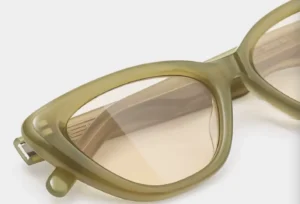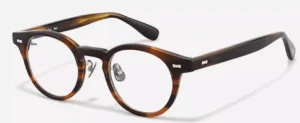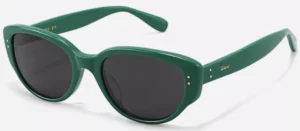The plethora of options for new frames may overwhelm you, and the latest Google search results may leave you confused. What’s the best material? Why use “acetate” sunglasses? Acetate vs Plastic , What is the difference between acetate and plastic eyeglass frames? Are Acetate Frames Better than Plastic Eyeglass Frames ? And why is the price of acetate eyewear so different?
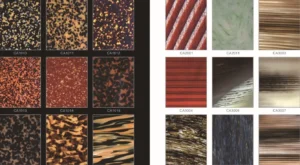
In short, acetate, also known as cellulose acetate, is a plant-based, low-allergenic nylon plastic. But the regular plastic frames are made from petroleum-based nylon pellets.
In this article, sunglasses manufacturers will reveal the pros and cons of acetate and plastic frames, explain in more detail the differences between them, and provide you with a more intuitive understanding of which material to choose for your eyewear.
1.What is Cellulose Acetate?
Acetate, also known as cellulose acetate, zyl or zylonite, is a synthetic fiber that manufacturers use to produce eyeglass frames. Scientist Paul Schützenberge developed it in 1865, making it one of the earliest synthetic fibers.

Although people did not use acetate frames in eyeglass production until the late 1940s, they now admire them for their deep luster and high transparency. The quality of acetate affects its shine and clarity, and wearers often describe it as having a more “natural feel” compared to standard plastic.

Acetate comes from a (biological) polymer derived from wood pulp and/or natural cotton fibers. Cheaper alternatives like injected nylon and polyester have replaced these cellulose fibers over the years. While nylon is a reasonable choice for sports or safety goggles, manufacturers almost always use it in fashion eyewear to reduce costs, resulting in lower quality and less attractive final designs.
2. Why does the acetate eyeglass frame stand out as so unique?
The production of acetate eyewear frames can achieve a range of colors and patterns without having to paint the frames.

The layering of the acetate fiber gives the eyeglass frames differing degrees of transparency and patterning. Then this beautiful design makes the acetate eyewear frames a more ideal choice than regular plastic eyeglass frames.
3. How do acetate sunglass frames get made?
Acetate possesses unique qualities unlike regular plastic, thanks to its distinct manufacturing process. Transparent acetate sheets combine with organic dyes and acetone to achieve vivid colors and exciting patterns, making them ideal for use in eyewear frames.
To make frames, workers first press acetate into sheets, then cut it into smaller pieces and press again with other colored acetate. CNC mills cut out the shape of the glasses, then craftspeople manually finish over 160 steps to not just beautify but also reliably construct the frames.
Learn More: How Are Sunglasses Made ?
4. Acetate frames vs plastic frames. What makes them different?
Acetate frames weigh less and people generally consider them higher quality than plastic frames. Manufacturers know acetate sheets for their low allergenicity, so people with sensitive skin often choose them. Unlike some plastic or metal frames that can trigger allergic reactions.

You can find very high-quality plastic frames. However, custom eyewear manufacturers better suit acetate fiber for glasses than other plastics, making customers more popularly choose acetate eyeglass frames for these reasons:
- It is environmentally friendly
- Made from renewable materials
- Hypoallergenic
- Organic processes create abundant colors/patterns
- Can make elegant transparency
- Pleasing tactile feel
- Excellent workability and plasticity
- Customers can adjust higher-end versions
- Creative mix-and-match potential excites designers’ and consumers’ curiosity
These compelling attributes set this plant-based product apart as very unique. Today, manufacturers make quality acetate frames renowned for lightweight thinness and strength. Yet they remain flexible, glassy clear. Moreover, they have the widest range of finishes – high gloss polished, matte or strings. However, in some cases, people better choose plastic frames over acetate. For example, during sports they are a better choice, and far more affordable.
5. When should you choose acetate eyeglass frames?
(1) Lightweight comfort
As a daily accessory, lightweight acetate fiber frames do not heavily burden the nose bridge. From opening eyes in the morning to laying head on pillow at night, wearing glasses all day causes minimal discomfort.

(2) Durability
This key factor sets acetate fiber frames apart from traditional plastic or other materials. Manufacturers make acetate frames by cutting, shaping and polishing multiple pieces, making them as sturdy as metal, the ideal eyeglass frames.
(3) Abundant designs
Would you consider choosing frames without any designs or colors? Clearly, manufacturers design acetate fiber eyeglass frames to prioritize stylish designs first. Acetate fiber proves itself as the frames defining fashionable, trendy eyewear.

Traditional plastic frames usually get sprayed with surface colors and patterns. They may have a great design or color. But daily use causes the surface colors and patterns to fade. After months or a year, their exterior may not look as good. Unlike plastic frames, acetate makes designs easier to retain. Manufacturers can create acetate sheets with vibrant embedded patterns, layering, and color choices, more effectively maintaining characteristics without needing sprays or paints.
6. In conclusion of acetate vs plastic
You can now see there are many differences between acetate and plastic eyeglass frames, each with pros and cons to suit different needs of wearers.
Plastic eyeglass frames are often lighter and more durable than acetate frames, making them well-suited for wearing during sports or activities. Additionally, plastic frames can come in a variety of colors and patterns to meet personalized style needs.

In contrast, acetate frames are often more aesthetically pleasing and textured, since their manufacturing and processing allows for more intricate patterns and details. These frames tend to be more expensive but also more durable and long-lasting.

Therefore, choosing eyeglass frames depends on the specific needs and preferences of the wearer. If you are unsure where to start, the basic tortoiseshell color glasses collection can be a great starting point.
